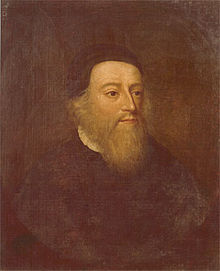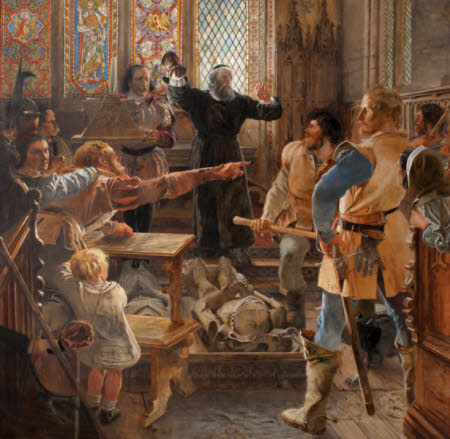A First Place to Preach:
In November 1552 he was presented to the vicarage of Norton, in the diocese of Durham. For this post, he went to Greenwich to preach in the Royal presence. His sermon on sacrilege was outstanding and displayed the high ideal he had formed of the clerical office. He was invested in 1556 with the archdeaconry of Durham.
A man of Principles:
The freedom of his attacks on the vices, and especially the clerical vices, of his times excited hostility against him, and he was formally brought before the bishop on a charge consisting of thirteen articles. Tunstall, bishop of Durham, in 1557 not only dismissed the case, but presented the offender with the rich living of Houghton-le-Spring.
His enemies obtained a royal warrant for his apprehension, upon which Gilpin prepared for martyrdom. Fortunately for him, he broke his leg on the journey to London, and his arrival was thus delayed till the news of Queen Mary's death freed him from further danger. He at once returned to Houghton-le-Spring where he continued to labour.
A Hospitable Man:
At Houghton his course of life was a ceaseless round of benevolent activity. Strangers and travellers found a ready reception; and even their horses were treated with so much care that it was humorously said that, if one were turned loose in any part of the country, it would immediately make its way to the rector of Houghton.
His Belief in Education for all:
He built a grammar-school, educated and maintained a large number of poor children at his own charge, and provided the more promising pupils with means of studying at the universities.
Apostle of the North:
He made regular visits to the most neglected parts of Northumberland, Yorkshire, Cheshire, Westmorland and Cumberland, supporting the local clergy.
The Glove above the Door:
His boldness is well illustrated by his action in regard to duelling.
He was surprised, on entering Rothbury church to preach one day, to see a gauntlet hanging above the altar. Upon enquiring the meaning of a symbol so indecorous being displayed in that sacred place, he was informed by the clerk that the glove was that of a famous swordsman (Mr Charlton of Lee Hall), who hung it there as an emblem of a general challenge and gage of battle, to any who should dare to take the fatal token down. "Reach it to me", said the reverend churchman. The clerk and sexton equally declined the perilous office, and the good Bernard Gilpin was obliged to remove the glove with his own hands, desiring those who were present to inform the champion that he, and no other, had possessed himself of the gage of defiance. But the champion was as much ashamed to face Bernard Gilpin as the officials of the church had been to displace his pledge of combat.
Gladstone's Tribute:
Bernard Gilpin’s theological position was not in accord with any of the religious parties of his age. Gladstone in 1888 described Gilpin as an important link between the pre-reformation Catholic Church and the more modern church of England: though a Catholic priest by ordination, Gilpin could not be described as Roman in his sympathies; indeed, it would be truer to say that his tone of mind, as ecclesiastic and as educationist, was more what would now be reckoned as Anglican.
Bernard Gilpin, a man of deep Christian convictions and unimpeachable honesty, was deservedly held in honour, not only by the conforming priests of whom he was one, but also by the new Anglicans, ordained under the new emerging regime.

Bernard Gilpin (1517–1583)
He was an Oxford theologian and then an influential clergyman in the emerging Church of England spanning the reigns of Henry VIII, Edward VI, Jane, Mary and Elizabeth I.
He was known as the 'Apostle of the North’ for his work in the wilds of northern England.
An Educated Man:
He entered The Queen's College, Oxford in 1533, gaining a BA, an MA and a BD. He was elected fellow of Queen's and ordained in 1542.

